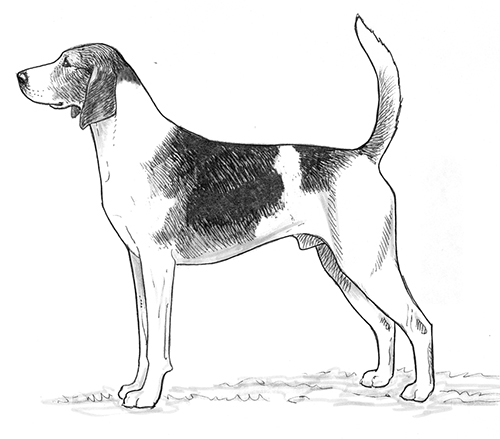Anglo Francais de Petite Venerie
Scenthound Group
The goals and purposes of this breed standard include: to furnish guidelines for breeders who wish to maintain the quality of their breed and to improve it; to advance this breed to a state of similarity throughout the world; and to act as a guide for judges.
Breeders and judges have the responsibility to avoid any conditions or exaggerations that are detrimental to the health, welfare, essence and soundness of this breed, and must take the responsibility to see that these are not perpetuated.
Any departure from the following should be considered a fault, and the seriousness with which the fault should be regarded should be in exact proportion to its degree and its effect upon the health and welfare of the dog and on the dog’s ability to perform its traditional work.
History
Developed in France, most likely beginning during the 16th Century, the Anglo Francais de Petite Venerie was created by crossing English hounds with the French hounds. It was used as a scenthound for hunting small game.
The Anglo Francais de Petite Venerie was recognized by the United Kennel Club January 1, 1996.
General Appearance
A medium sized, well balanced and solidly built hound, with no trace of coarseness. In outline, his profile must appear to be that of a classic French hound.
Head
The head is fairly long, and not too broad.
SKULL
The skull is slightly convex, but not domed. There is no prominence of occiput. The stop is very slight.
Fault: Round skull.
MUZZLE
The muzzle is moderately long, and just a little pointed. The nasal bridge is straight or slightly arched. The upper lips cover the lower lips.
Fault: Square lips.
TEETH
The Anglo Francais de Petite Venerie has a complete set of evenly spaced, white teeth meeting in a scissors bite.
Faults: Undershot or overshot bite.
NOSE
The nostrils are well opened, and the nose is fully pigmented. In the white and black dogs, the nose is black. In the white and orange dogs, the nose is brown.
Fault: Butterfly nose.
EYES
The eyes are large and brown, with a soft, intelligent expression.
Faults: Light or prominent eyes.
EARS
The ears are finely attached below the level of the eye. They are flexible, slightly turned, and of medium width. They reach almost to the border of the nose.
Faults: High set, broad or short ears.
Neck
Free of dewlap.
Forequarters
The shoulder blades are long, flat, and sloping.
FORELEGS
Strong and straight.
Body
The chest is well developed, and let down at least to the level of the elbow. The ribs are long and moderately rounded. The back is firm and straight. The loin is quite short and muscular, and the croup is fairly long and slightly sloping. There is a slight tuck up.
Hindquarters
The thighs are deep and muscular. The hocks are slightly bent, and close to the ground.
Feet
Lean and tight.
Tail
The tail is set on as an extension of the spine. It is medium in length and quite fine. There is no brush.
Coat
Short, dense, and smooth.
Color
White and black, with bright or pale tan markings. Orange and white.
Height
Height at the withers is between 19 and 22 inches.
Disqualifications
(A dog with a Disqualification must not be considered for placement in a conformation event, and must be reported to UKC.)
Unilateral or bilateral cryptorchid.
Viciousness or extreme shyness.
Albinism.

Looking for a Dog?
Find a dog that will fit your family.
Note: The breeders on this list are not endorsed by UKC.
©Copyright 1996, United Kennel Club
